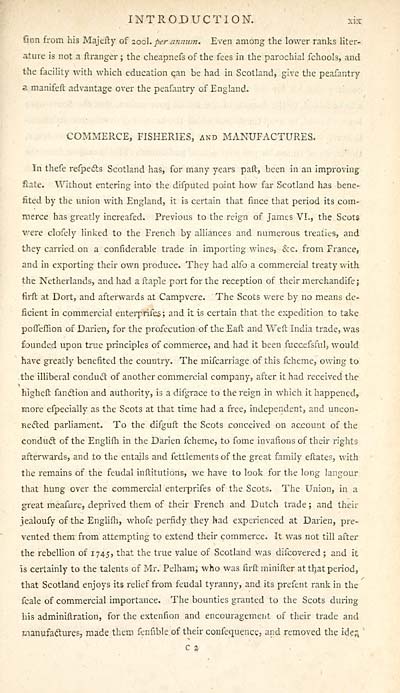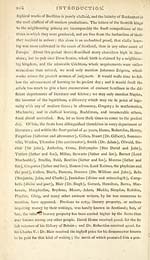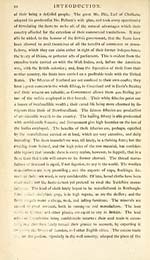Gazetteer of Scotland
(27) Page xix
Download files
Complete book:
Individual page:
Thumbnail gallery: Grid view | List view

INTRODUCTION. xi:c
(ion from his Majefty of 200I. per annum. Even among the lower ranks liter-
ature is not a ftranger ; the cheapnefs of the fees in the parochial fchools, and
the facility with which education can be had in Scotland, give the peafantry
a manifeft advantage over the peafantry of England.
COMMERCE, FISHERIES, and MANUFACTURES.
In thefe refpects Scotland has, for many years paft, been in an improving
fcate. Without entering into the difputed point how far Scotland has bene-
fited by the union with England, it is certain that fince that period its com-
merce has greatly increafed. Previous to the reign of James VI., the Scots
were clofely linked to the French by alliances and numerous treaties, and
they carried on a confiderable trade in importing wines, &c. from France,
and in exporting their own produce. They had alio a commercial treaty with
the Netherlands, and had a ftaple port for the reception of their merchandife ;
firft at Dort, and afterwards at Campvere. The Scots were by no means de-
ficient in commercial enterprifes; and it is certain that the expedition to take
poffeffion of Darien, for the profecution of the Eaft and Weft India trade, was
founded upon true principles of commerce, and had it been fuccefsful, would
have greatly benefited the country. The mifcarriage of this fcheme, owing to
the illiberal conduct of another commercial company, after it had received the
higheft fanclion and authority, is a dilgrace to the reign in which it happened,
more efpecially as the Scots at that time had a free, independent, and uncon-
nected parliament. To the difguft the Scots conceived on account of the
conduct of the Englifh in the Darien fcheme, to fome invafions of their rights
afterwards, and to the entails and fettlements of the great family eftates, with
the remains of the feudal inftitutions, we have to look for the long langour
that hung over the commercial enterprifes of the Scots. The Union, in a
great meafure, deprived them of their French and Dutch trade ; and their
jealoufy of the Englifh, whofe perfidy they had experienced at Darien, pre-
vented thenrfrom attempting to extend their commerce. It was not till after
the rebellion of 1745, that the true yalue of Scotland was difcovered ; and it
is certainly to the talents of Mr. Pelham, who was firft minifter at that period,
that Scotland enjoys its relief from feudal tyranny, and its prefent rank in the
fcale of commercial importance. The bounties granted to the Scots during
his adminiftration, for the extenfion and encouragement of their trade and
manufactures, made them fenfible of their confequence, and removed the ide-
c %
(ion from his Majefty of 200I. per annum. Even among the lower ranks liter-
ature is not a ftranger ; the cheapnefs of the fees in the parochial fchools, and
the facility with which education can be had in Scotland, give the peafantry
a manifeft advantage over the peafantry of England.
COMMERCE, FISHERIES, and MANUFACTURES.
In thefe refpects Scotland has, for many years paft, been in an improving
fcate. Without entering into the difputed point how far Scotland has bene-
fited by the union with England, it is certain that fince that period its com-
merce has greatly increafed. Previous to the reign of James VI., the Scots
were clofely linked to the French by alliances and numerous treaties, and
they carried on a confiderable trade in importing wines, &c. from France,
and in exporting their own produce. They had alio a commercial treaty with
the Netherlands, and had a ftaple port for the reception of their merchandife ;
firft at Dort, and afterwards at Campvere. The Scots were by no means de-
ficient in commercial enterprifes; and it is certain that the expedition to take
poffeffion of Darien, for the profecution of the Eaft and Weft India trade, was
founded upon true principles of commerce, and had it been fuccefsful, would
have greatly benefited the country. The mifcarriage of this fcheme, owing to
the illiberal conduct of another commercial company, after it had received the
higheft fanclion and authority, is a dilgrace to the reign in which it happened,
more efpecially as the Scots at that time had a free, independent, and uncon-
nected parliament. To the difguft the Scots conceived on account of the
conduct of the Englifh in the Darien fcheme, to fome invafions of their rights
afterwards, and to the entails and fettlements of the great family eftates, with
the remains of the feudal inftitutions, we have to look for the long langour
that hung over the commercial enterprifes of the Scots. The Union, in a
great meafure, deprived them of their French and Dutch trade ; and their
jealoufy of the Englifh, whofe perfidy they had experienced at Darien, pre-
vented thenrfrom attempting to extend their commerce. It was not till after
the rebellion of 1745, that the true yalue of Scotland was difcovered ; and it
is certainly to the talents of Mr. Pelham, who was firft minifter at that period,
that Scotland enjoys its relief from feudal tyranny, and its prefent rank in the
fcale of commercial importance. The bounties granted to the Scots during
his adminiftration, for the extenfion and encouragement of their trade and
manufactures, made them fenfible of their confequence, and removed the ide-
c %
Set display mode to: Large image | Transcription
Images and transcriptions on this page, including medium image downloads, may be used under the Creative Commons Attribution 4.0 International Licence unless otherwise stated. ![]()
| Gazetteers of Scotland, 1803-1901 > Gazetteer of Scotland > (27) Page xix |
|---|
| Permanent URL | https://digital.nls.uk/97343752 |
|---|

